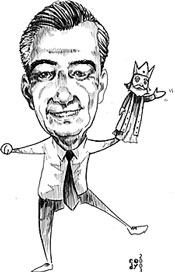 |
|
Illustration by Cody Angel
|
By Phil Leckman
Arizona Daily Wildcat
Monday March 3, 2003
In this age of hype and hyperbole, it's all too easy for powerful words to lose their meanings. And few words are misused more often than "hero," a once-noble word so diluted by misapplication ¸ by talk of sports heroes, say, or heroes of music or television ¸ that in many circumstances it now seems little more than a pleasant sound.
So when I say that Fred Rogers, the longtime children's television host who died last week at age 74, was one of my heroes, please don't be confused. I am not suggesting that Mr. Rogers possessed a courage or nobility that places him among the ranks of heroes like the firefighters of New York City. Mr. Rogers performed no feats of awesome bravery or swashbuckling derring-do. But in his own way, he set a powerful example for the world, an example that many of us would do well to take to heart.
In almost every way, "Mr. Rogers' Neighborhood" ¸ the PBS show that Rogers hosted each weekday for 38 years ¸ defied what the conventional wisdom of both advertisers and educators suggest children are looking for. Even in contrast to other PBS children's shows like "Sesame Street," "Mr. Rogers' Neighborhood" clearly stood by itself.
Take the Land of Make-Believe, for instance. The highlight of the program's simple set, this modest fantasy kingdom was simply a single room, filled with papier-mache windmills and castles and populated not by boisterous Muppets but by a quiet family of simple marionettes and somewhat threadbare hand puppets. In place of excitement, bright colors or peppy theme music, "Mr. Rogers' Neighborhood" offered only a stoop-shouldered, grandfatherly man in a sweater, singing gentle songs as he laced up his loafers.
As a collection of quotes posted last week on CNN.com demonstrates, this gentleness and lack of pretense defined Rogers and his life, both on and off screen. Again and again, Rogers's words outline a set of basic values: humility, tolerance, acceptance, kindness and peacemaking.
If his simple, slow-moving television program stood in contrast to other PBS kid shows, the quiet but confident way in which Rogers advocated his ideas and beliefs sets him even further apart from the mainstream of current American culture. We have become a nation of brawlers, of arrogant braggarts who speak before they think.
Anger and confrontation, once rightly seen as emotions to be avoided in favor of consensus and compromise, are now viewed almost as cardinal male virtues. From popular music to professional athletics to the highest levels of politics, Americans now seem to equate masculinity and power with strong words and macho bluster.
Take last semester's furor over UA football coach John Mackovic's tearful press conference as an example ¸ were the sportscasters and talking heads who called for his ouster more upset by his poor record and abusive treatment of his players, or by the belief that by crying in public he had revealed himself as a "wimp"?
If publicly displayed compassion and emotion make one wimpy, then Mr. Rogers was a proud and inveterate wimp. But if his soft-spoken convictions set him at odds with many definitions of what it meant to be a "real man," Rogers never seemed concerned. For decades, his words and actions articulated a different standard for masculinity and maturity, one based on understanding and empathy rather than "toughness," anger or bravado.
By teaching children tools for tolerance and understanding, Rogers hoped to make the world a better place. He must have realized he faced an uphill climb ¸ conflict and aggression are so firmly ingrained in our culture that most of us take them for granted. For many of the millions who grew up with Mr. Rogers as their neighbor, however, his persistent gentleness left a lasting impression. The seeds of tolerance and understanding he planted may be small. But for those who accept them, who take his words to heart, Mr. Rogers' legacy will continue to bear fruit.
"Of course I get angry. Of course I get sad," Rogers once said, "I have a full range of emotions. I also have a whole smorgasbord of ways of dealing with my feelings. That is what we should give children. Give them ... ways to express their rage without hurting themselves or somebody else. That's what the world needs."

